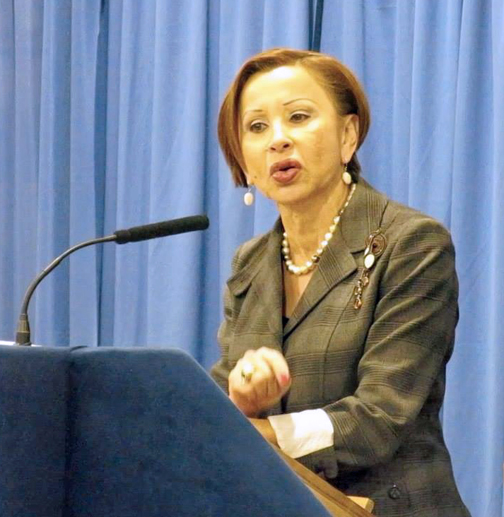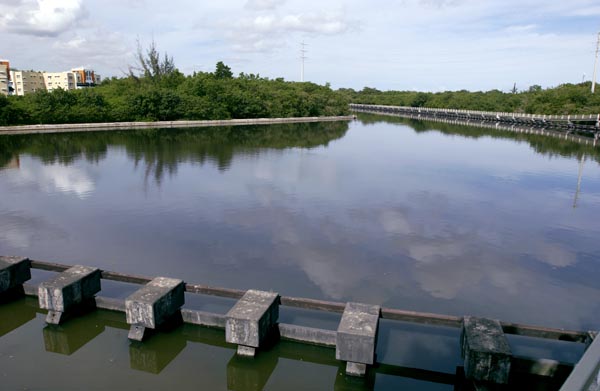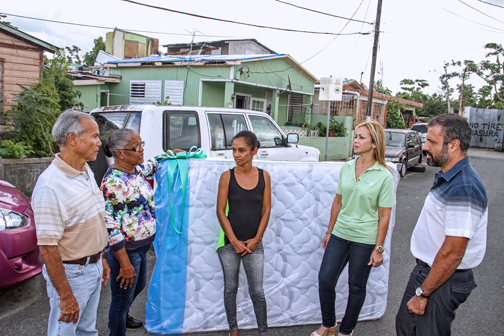U.S. House approves Velázquez P.R. amendments to Disaster Funding Bill

Washington, DC – The U.S. House of Representatives has approved two proposals authored by Rep. Nydia M. Velázquez (D-NY) aimed at assisting Puerto Rico, as the island continues recovering from economic hardship and historically catastrophic hurricanes.
The amendments were approved as
part of H.R. 268, a supplemental spending bill that appropriates additional
funding for disaster assistance.
“I want to thank Chairwoman
Lowey and all my colleagues for passing legislation to help Puerto Rico, Texas,
Florida, California and other parts of our nation affected by recent
disasters,” Velázquez said.
“I’m especially appreciative
that the Chairwoman worked with me to pass two amendments that will help
address nutritional and environmental challenges in Puerto Rico,” she said.
H.R. 268 included $600 million
in funding for the Nutrition Assistance Program for Puerto Rico, the amount
requested by Gov. Ricardo Rosselló to ensure residents of the island continue
receiving vital nutrition assistance.
In addition, the House approved
a Velázquez amendment that would appropriate funding to study how properly
funding NAP helps the Island, ensuring food security and well-being for those
who live there.
“I thank my Democratic
colleagues for securing $600 million for the NAP program, so we can continue
providing food assistance to the people of Puerto Rico as they continue
recovering from the historic damage from Hurricane María,” Velázquez said.
“This is a lifeline of funding
that Congressional Republicans failed to include in previous appropriations Bills
and I’m pleased to see it passed,” Velázquez said,
“In addition, my amendment
would provide additional resources to carefully examine the NAP program, look
at disparities between how it functions in Puerto Rico versus the mainland and
begin building the groundwork to address food insecurity on the Island for the
long term,” she added.
Velázquez’s amendment
appropriates $5 million to conduct an analysis of how the NAP program functions
with the intent of improving performance.
The U.S. House also voted to
include legislation authored by the Congresswoman to help address a
longstanding environmental sore spot in Puerto Rico.
For decades, The Martín Peña Channel
in San Juan has been a repository for sewage overflow, mercury and PCBs.
The canal was once a navigable and commercially used channel. Today, it
is so clogged that it is possible to walk across it on some parts.
Due to the clogging, the
approximately 25,000 US citizens who live near the Martín Peña Channel face
significant public health and safety challenges. Combined storm water and
the regional sewer system contribute to high concentration of coliforms in the
channel and the waterway frequently floods after heavy rains putting residents
into direct contact with polluted water.
Exposure to these polluted
waters cause elevated risk of gastrointestinal diseases and a higher prevalence
of chronic diseases and asthma. These ailments have been detected in children 5
years old and younger.
Velázquez’s amendment would
appropriate $25 million for dredging the channel, an important step toward
environmental remediation.
“For decades, [Martín Peña Channel]
has been an environmental sore spot in San Juan and a health hazard for
surrounding communities,” said Velázquez. “For the families and especially
children who live in the surrounding area, flooding of contaminated water from
the canal represents a serious public health threat.”
“With thousands of structures
continuing to discharge sewage into the canal and the presence of Mercury, lead
and PCBs, we have an obligation to see the remediation of this troubled
waterway. My amendment would allocate additional federal resources to help
resolve this problem and I thank my colleagues for helping pass it,” she said.
The Emergency Supplemental
bill, with Velázquez’s amendments passed the U.S. House by a vote of 237 to
187. The legislative package now moves to the U.S. Senate for
consideration.











Its sad that structures alongside the channel are doing the discharging of sewage. I wonder where they get it? Why not collect it and pump it into barge tanks to be towed to a bio-fueled energy station in Cataño? Of course, the government could buy the offending buildings and move the people, so walls could allow clean land fill to raise the building ground level to higher elevation with new roads and make a new park.
The people can be sent to the states where jobs and better housing in FL are easy to find in the Trumpian economy.